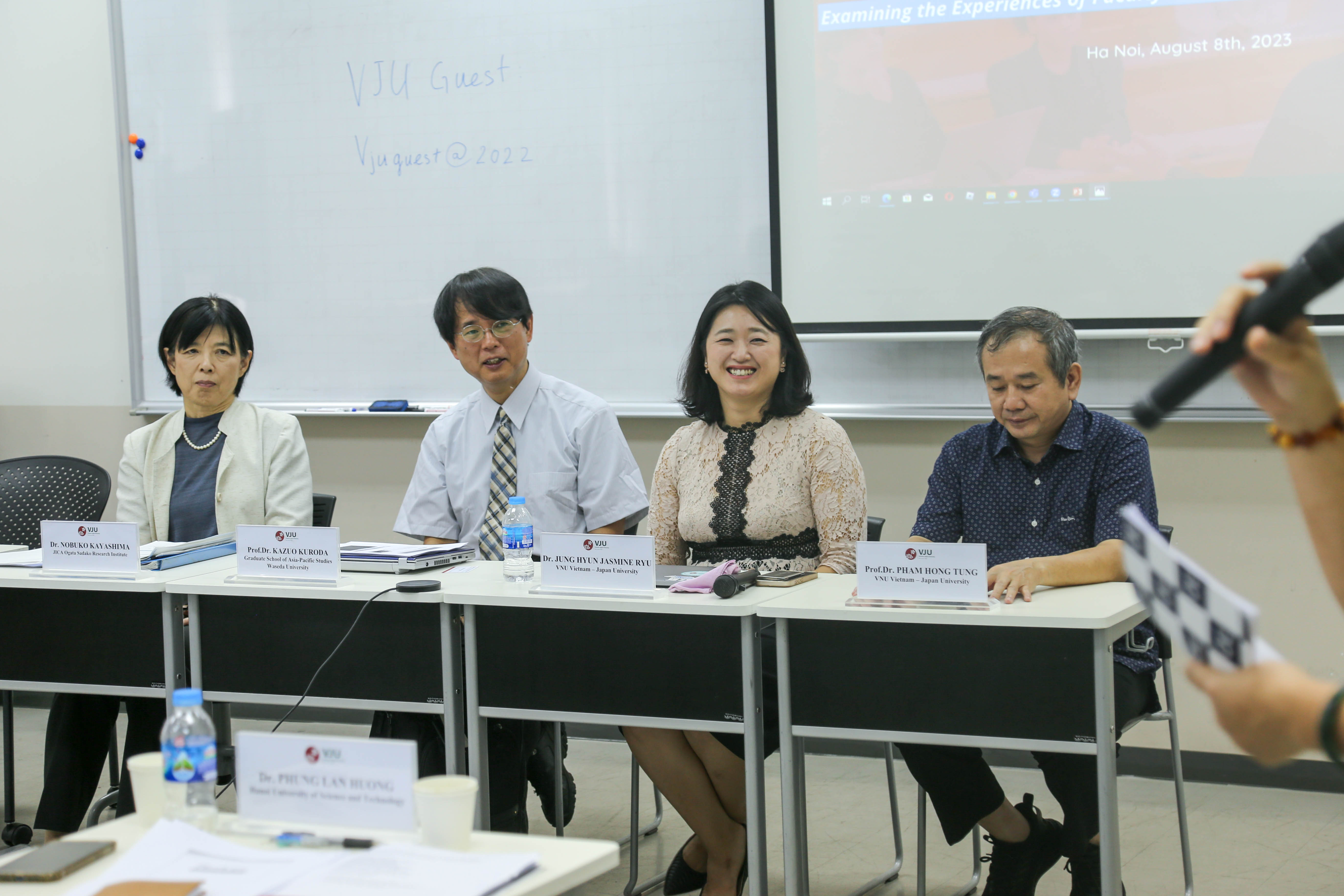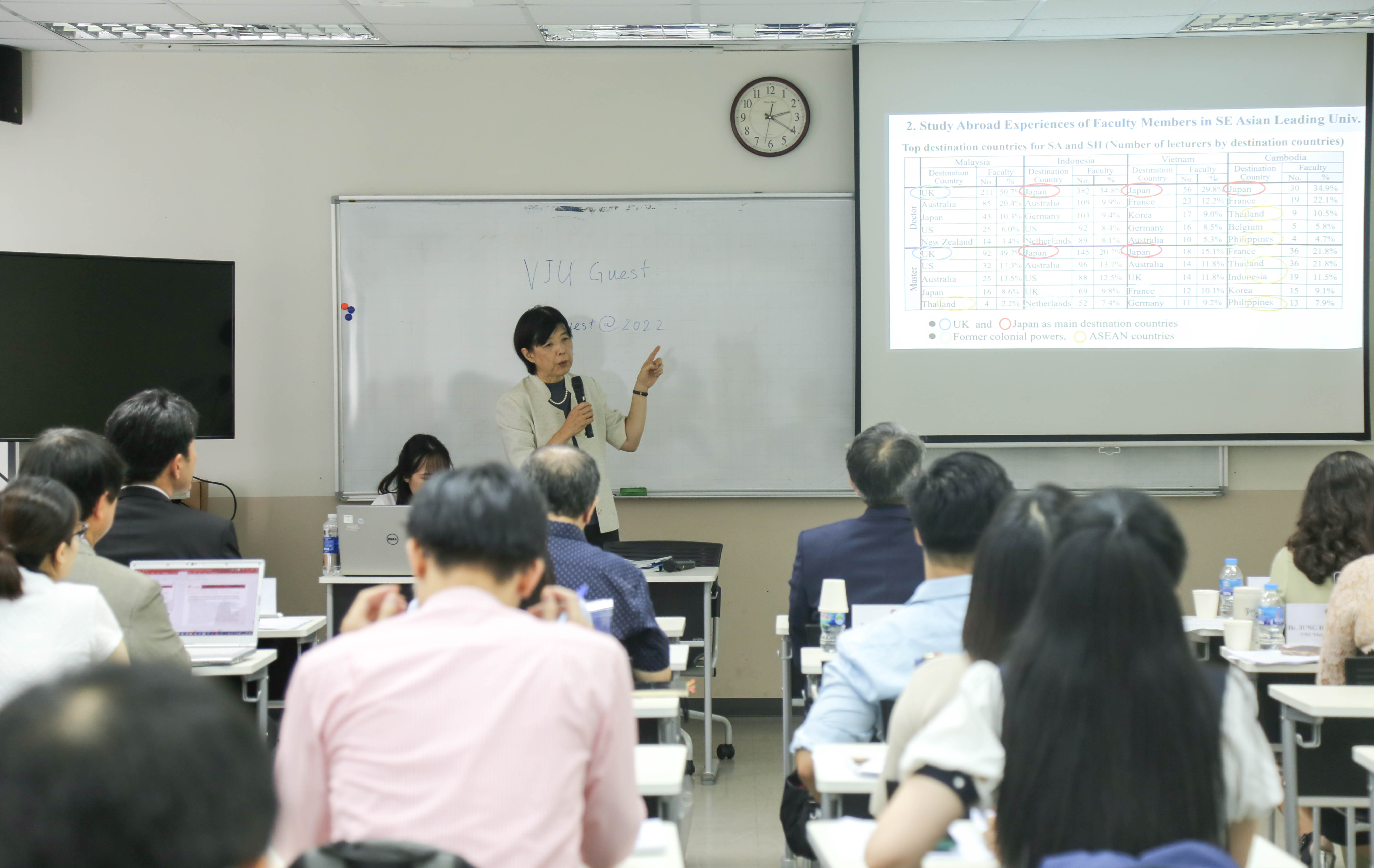JICA–VJU Joint Seminar on Higher Education: Impacts of Study Abroad on Higher Education Development
2023.09.20
On Aug. 8, 2023, JICA and Vietnam Japan University (VJU) held a joint seminar, “Impacts of Study Abroad on Higher Education Development” at the My Dinh Campus of Vietnam Japan University. Diverse stakeholders in Vietnamese higher education attended the seminar, which was organized under the purview of a larger project titled “Empirical Research on Impacts of Study Abroad in Developing Countries – based on Study Abroad Experiences of Academic Professionals of Major Universities in ASEAN Countries.” This project was spearheaded by the JICA Ogata Sadako Research Institute for Peace and Development (JICA Ogata Research Institute).

Discussing the impact of study abroad on Vietnam’s development (Photo credit: Vietnam Japan University)
The project, initiated in 2018, involved collaborations with 10 leading universities in four ASEAN countries to understand the impact of faculty study abroad on individual and institutional development. Survey data were collected from faculty members at the 10 universities between 2019 and 2022. Interviews were also conducted with a subset of the survey respondents. Vietnam National University (VNU) and Hanoi University of Science and Technology (HUST) participated in this research initiative in Vietnam.
During the seminar, Project Leader Kayashima Nobuko (senior research advisor at the JICA Ogata Research Institute) shared the results of the analysis of data obtained from about 3,300 faculty respondents across the 10 participating universities. She revealed the postreturn positive influences of faculty study abroad programs across all country contexts on educational and research activities, social contribution, and university management. Further, study abroad programs were found to exert a greater impact on international education and research activities than on domestic education and research activities. The study also found that the influence of study abroad programs weakened in certain dimensions as higher education advanced in the target countries. Moreover, faculty members engaged in studying abroad in Japan reported common outcomes such as sustained associations with their academic advisors and increased academic cooperation. In the case of Vietnam, study abroad programs increased foreign language abilities and were thus linked to a higher frequency of teaching courses and foreign language publishing. Kayashima highlighted that “in the context of higher education development, the significance of study abroad has shifted from the ‘importation of knowledge and technology from developed countries’ to a ‘pathway to the formation of international academic networks.’ As academic exchange increases within ASEAN, Vietnam’s role as both a sending and receiving country will become increasingly important.”

Kayashima Nobuko, senior research advisor at the JICA Ogata Research Institute (Photo credit: Vietnam Japan University)
Jung Hyun Jasmine Ryu (JICA expert and lecturer, VJU) presented a case study based on the Vietnamese context. This case study revealed that faculty study abroad programs exerted a positive impact on education, research and social contribution. It thus endorsed the importance of faculty study abroad programs for the development of higher education in Vietnam. Conversely, the case study also disclosed that study abroad programs can contribute to a sense of disorientation upon the individual’s return and result in the loss of personal networks at the home campus.
Kuroda Kazuo is a professor at Waseda University and a visiting fellow at the JICA Ogata Research Institute. He serves as a core member of the project research team and a member of the Japanese Ministry of Education, Culture, Sports, Science and Technology (MEXT) Committee on Strategic Promotion of International Student Exchange. He overviewed the current state of student exchanges between Vietnam and Japan and introduced the new international student policy directions of the Japanese government. The incidence of Vietnamese students studying in Japan has increased rapidly in recent years. Vietnamese students accounted for almost 25% of all international students in Japan in 2019. In terms of government policy, the need to further promote international student exchanges has been discussed in the context of the growth of higher education in the ASEAN region and the realization of the concept of a “free and open Indo Pacific.”
The seminar closed with a question-and-answer session on a wide range of topics, including the project’s theoretical contributions to the development of higher education, its implications for national and institutional faculty development programs, and the impact of inbound international students on the internationalization of higher education in Vietnam.
Data analysis continues and the study’s results will be published in a forthcoming edited volume.
A recent news article published by Viet Nam News featured the seminar. The article may be accessed via the link below.

事業事前評価表(地球規模課題対応国際科学技術協力(SATREPS)).国際協力機構 地球環境部 . 防災第一チーム. 1.案件名.国 名: フィリピン共和国.

事業事前評価表(地球規模課題対応国際科学技術協力(SATREPS)).国際協力機構 地球環境部 . 防災第一チーム. 1.案件名.国 名: フィリピン共和国.

事業事前評価表(地球規模課題対応国際科学技術協力(SATREPS)).国際協力機構 地球環境部 . 防災第一チーム. 1.案件名.国 名: フィリピン共和国.

事業事前評価表(地球規模課題対応国際科学技術協力(SATREPS)).国際協力機構 地球環境部 . 防災第一チーム. 1.案件名.国 名: フィリピン共和国.

事業事前評価表(地球規模課題対応国際科学技術協力(SATREPS)).国際協力機構 地球環境部 . 防災第一チーム. 1.案件名.国 名: フィリピン共和国.
scroll